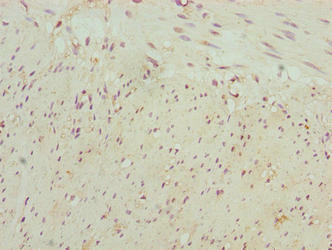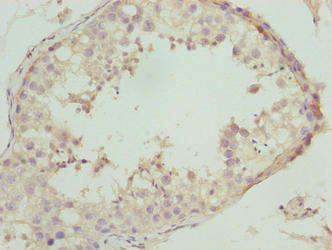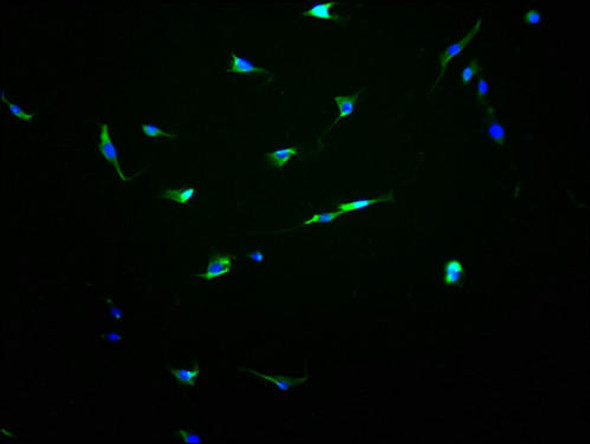Description
| Antibody Name: | NBPF3 Antibody (PACO41046) |
| Antibody SKU: | PACO41046 |
| Size: | 50ug |
| Host Species: | Rabbit |
| Tested Applications: | ELISA, WB, IHC |
| Recommended Dilutions: | ELISA:1:2000-1:10000, WB:1:1000-1:5000, IHC:1:20-1:200 |
| Species Reactivity: | Human |
| Immunogen: | Recombinant Human Neuroblastoma breakpoint family member 3 protein (1-252AA) |
| Form: | Liquid |
| Storage Buffer: | Preservative: 0.03% Proclin 300 Constituents: 50% Glycerol, 0.01M PBS, PH 7.4 |
| Purification Method: | Antigen Affinity Purified |
| Clonality: | Polyclonal |
| Isotype: | IgG |
| Conjugate: | Non-conjugated |
 | Western blot. All lanes: NBPF3 antibody at 1.2µg/ml. Lane 1: PC-3 whole cell lysate. Lane 2: HT29 whole cell lysate. Secondary. Goat polyclonal to rabbit IgG at 1/10000 dilution. Predicted band size: 73, 68, 72, 33, 66 kDa. Observed band size: 73 kDa. |
 | Immunohistochemistry of paraffin-embedded human colon tissue using PACO41046 at dilution of 1:100. |
 | Immunohistochemistry of paraffin-embedded human testis tissue using PACO41046 at dilution of 1:100. |
| Background: | positive regulation of protein targeting to mitochondrion |
| Synonyms: | Neuroblastoma breakpoint family member 3 (Protein AE2) (Protein SHIIIa4), NBPF3 |
| UniProt Protein Function: | NBPF3: Belongs to the NBPF family. 4 isoforms of the human protein are produced by alternative splicing.Chromosomal Location of Human Ortholog: 1p36.12Cellular Component: cytoplasm |
| UniProt Protein Details: | |
| NCBI Summary: | This gene is a member of the neuroblastoma breakpoint family (NBPF) which consists of dozens of recently duplicated genes primarily located in segmental duplications on human chromosome 1. This gene family has experienced its greatest expansion within the human lineage and has expanded, to a lesser extent, among primates in general. Members of this gene family are characterized by tandemly repeated copies of DUF1220 protein domains. DUF1220 copy number variations in human chromosomal region 1q21.1, where most DUF1220 domains are located, have been implicated in a number of developmental and neurogenetic diseases such as microcephaly, macrocephaly, autism, schizophrenia, mental retardation, congenital heart disease, neuroblastoma, and congenital kidney and urinary tract anomalies. Altered expression of some gene family members is associated with several types of cancer. This gene family contains numerous pseudogenes. [provided by RefSeq, Feb 2013] |
| UniProt Code: | Q9H094 |
| NCBI GenInfo Identifier: | 74733518 |
| NCBI Gene ID: | 84224 |
| NCBI Accession: | Q9H094.1 |
| UniProt Secondary Accession: | Q9H094,Q3BBW1, Q5VTG2, Q5VTG3, Q5VTG4, Q8IX78, Q8ND86 Q8TC96, A8K965, B4DSP2 |
| UniProt Related Accession: | Q9H094 |
| Molecular Weight: | 72,951 Da |
| NCBI Full Name: | Neuroblastoma breakpoint family member 3 |
| NCBI Synonym Full Names: | neuroblastoma breakpoint family, member 3 |
| NCBI Official Symbol: | NBPF3 |
| NCBI Official Synonym Symbols: | AE2 |
| NCBI Protein Information: | neuroblastoma breakpoint family member 3; protein SHIIIa4 |
| UniProt Protein Name: | Neuroblastoma breakpoint family member 3 |
| UniProt Synonym Protein Names: | Protein AE2; Protein SHIIIa4 |
| Protein Family: | Glycoprotein |
| UniProt Gene Name: | NBPF3 |
| UniProt Entry Name: | NBPF3_HUMAN |






